Swords Against Death Re-Read: “Bazaar of the Bizarre”
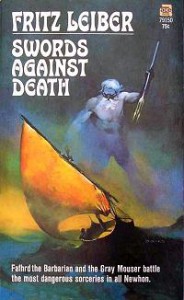 Bill Ward and I are re-reading a book from Fritz Leiber’s famous Lankhmar series, Swords Against Death. We hope you’ll pick up a copy and join us. This week we tackled the tenth and final tale in the volume, “Bazaar of the Bizarre.”
Bill Ward and I are re-reading a book from Fritz Leiber’s famous Lankhmar series, Swords Against Death. We hope you’ll pick up a copy and join us. This week we tackled the tenth and final tale in the volume, “Bazaar of the Bizarre.”
Bill: Let me just say right at the outset that this is one of the all time great fantasy titles — long before I’d ever read Leiber, I knew the title “Bazaar of the Bizarre” (from, I think, Dragon magazine) and it turned out to be the first story of Fafhrd and the Gray Mouser I’d ever read, in some since-forgotten anthology, and I still remember the anticipation leading up to it. I wasn’t disappointed.
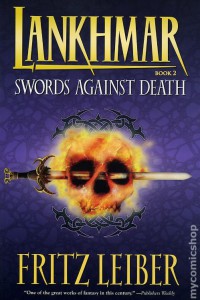 Howard: I’d remembered this one was strong, but I’d forgotten just how strong, or perhaps I just hadn’t had enough critical acumen to judge. It’s head and shoulders above even the very finest of the stories we’ve already read: “Bazaar of the Bizarre” is simply pitch perfect from first sentence to last. On the surface a “mere” tale of light adventure, “Bazaar” is a perfectly executed gem. I see now why it’s been chosen to be included in anthologies so many times, and why Fritz Leiber himself thought it one of his best.
Howard: I’d remembered this one was strong, but I’d forgotten just how strong, or perhaps I just hadn’t had enough critical acumen to judge. It’s head and shoulders above even the very finest of the stories we’ve already read: “Bazaar of the Bizarre” is simply pitch perfect from first sentence to last. On the surface a “mere” tale of light adventure, “Bazaar” is a perfectly executed gem. I see now why it’s been chosen to be included in anthologies so many times, and why Fritz Leiber himself thought it one of his best.
Bill: Everything these stories do well is here done perfectly.
Howard: If I were to cite every standout sentence in the story and explain it, I think the essay would be at least as long as the story itself. In “Bazaar” Leiber’s reached his mature tone but doesn’t over reach, as I might argue he did with “Pain-Ease” from last week. There’s beautiful poetic imagery, but it doesn’t stray and meander. There’s fantastic imagination , but it’s perfectly controlled. And the characters are front and center being their wonderful idiosyncratic selves.
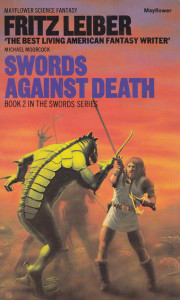 How about that second paragraph, where the vendors and peddlers “conduct their business almost as silently as the stars conduct theirs?” A first sign of the well-turned phrases that were to lie gleaming like fountain coins throughout this story. Long phrases, wonderful dialogue, even short descriptions (like “the garishly bright shop with its doorway like an upended heart) are all so crystal clear and vivid that I almost want to hang my head in shame for daring to be a writer myself. Honestly, I can’t think of a single sour note in the entire piece.
How about that second paragraph, where the vendors and peddlers “conduct their business almost as silently as the stars conduct theirs?” A first sign of the well-turned phrases that were to lie gleaming like fountain coins throughout this story. Long phrases, wonderful dialogue, even short descriptions (like “the garishly bright shop with its doorway like an upended heart) are all so crystal clear and vivid that I almost want to hang my head in shame for daring to be a writer myself. Honestly, I can’t think of a single sour note in the entire piece.
Bill: Exactly. As you say, we could essentially cite every line of this story as an example of ingenious writing — how about the very first paragraph for a model of concise opening — we have the “strange stars of the World of Nehwhon,” which immediately hints at the cosmic scope of the story’s chief peril, and sets up a starry extended metaphor for the next paragraph’s description of the Plaza of Dark Delights. Lankhmar is presented to us as a city “where swords clink almost as often as coins.” Simple and perfectly evocative of sword and sorcery.
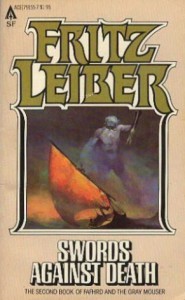 When we move to the descriptions of the Bazaar’s many contents Leiber gives us a masterclass of invention. Then we realize that the many strange and wondrous items in the shop are really moldering bits of filth — so in fact all these images are actually in the Mouser’s imagination, and the shop itself would probably seem to contain different wonders if it had been Fafhrd who had shown up early to the meeting with the wizards, rather than the Mouser.
When we move to the descriptions of the Bazaar’s many contents Leiber gives us a masterclass of invention. Then we realize that the many strange and wondrous items in the shop are really moldering bits of filth — so in fact all these images are actually in the Mouser’s imagination, and the shop itself would probably seem to contain different wonders if it had been Fafhrd who had shown up early to the meeting with the wizards, rather than the Mouser.
And how about those wizards? This is really the first time that we get a good understanding of who Sheelba and Ningauble really are, how they relate to the Gray Mouser and Fafhrd respectively. Having the wizards give Fafhrd some sorcerous gifts to use against the merchant was a great touch, reinforcing that our heroes are really encountering the weird, dealing with things that are inexplicable and beyond their normal abilities (it also, I suspect, gave D&D a few ideas for its treasure tables). But at the same time the archness, the playfulness of Leiber comes through — the wizards’s very different personalities are funny when contrasted with each other, or the notion of a trans-universe invasion through the utterly banal and innocuous portal of a shopfront (opportunity here for a tongue-and-cheek slap at consumerism as well) . The very best of these stories do that; they balance right on the edge of the playful and the perilous, and that tone conveys so much of the essence of the heroes themselves.
Howard: I loved every moment. The comical scenes where the Mouser’s sight is juxtaposed with Fafhrd’s. Or Fafhrd’s interaction with Sheelba and Ningauble when they give him the assignment, particularly the bit where Fafhrd pretend to have misunderstood Ningauble’s meanderings about “this doltish brave man who always follows his scheming uncle’s advice.” Then there are the wondrous moments where the Mouser is wandering the store and glimpsing amazing sights, and, of course, the grand finale, where Fafhrd fights the door keeper and it seems to Mouser, because of the enchantment he’s under, that the two are performing comic theatre.
The pacing is perfect. The prose is perfect. The start and conclusion are perfect (down to the brief glimpse Fafhrd obtains of Sheelba). The events are alternatingly comic, amusing, ironic and exciting, sometimes all at once. This story, far more than “Ill Met in Lankhmar,” should have garnered Leiber that Hugo.
Bill: Hell, it should have garnered him a Nobel, but I suppose real heroes are forever fated to stand apart.
Howard: Hah! Well, next week we’ll look back on what we read, and look forward a little to one more Leiber book, Swords in the Mist.
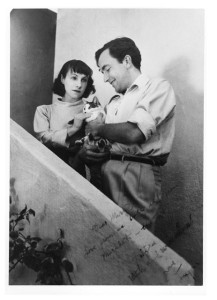
2 Comments